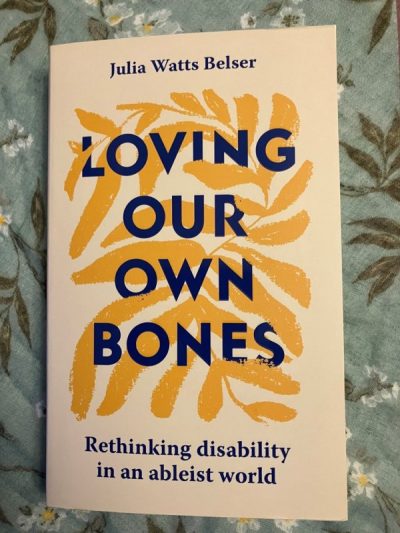Book review: Loving Our Own Bones

Becky Clegg, a Roofbreaker with personal experience of disability, reviews 'Loving Our Own Bones: Rethinking disability in an ableist world' by Julia Watts Belser
In her latest book, 'Loving our Own Bones', Watts Belser offers a glimpse into disability, aiming to address key questions of inner life and spirituality. She draws some fascinating insights from scriptures that may not be the first to come to mind when grappling with theology through the lens of disability. In this respect, her biblical explorations are quite refreshing and will be my focus here. However, readers should be aware of Watts Belser’s background as a Jewish rabbi, where the need for Jesus as the promised Messiah is overlooked.
God on wheels
'Loving our Own Bones' opens with a rather picturesque account of daily life and getting around with a disability. Seeing her walking gait as having a ‘distinctive rhythm’ had me smiling in recognition. Others may appreciate the tangible ‘wheels rolling over tarmac’. This leads into Watts Belser’s notion of ‘God on Wheels’, born of her identification with Ezekial’s vision of God appearing ‘on a vast chariot, lifted up by four angelic creatures with fused legs, lustrous wings, and great wheels’. God is seen as identifying with the joys and freedom of freewheeling, as well as the pains and frustrations of negotiating obstacles along the way; (obstacles being the disabling factor, not impairment itself, according to the social model of disability highlighted here).
With the final chapter of 'Loving our Own Bones' also devoted to ‘God on Wheels’, Watts Belser speculates on God’s own body. It may seem fair enough that this line of thought is based on the biblical concept of everyone being born in God’s own image. However, trying to humanise God dismisses God’s omnipresence and divinity which spans beyond any human understanding. At least one paragraph is a direct repetition of one found in the opening chapter. It is beautifully descriptive and underlies Watts Belser’s enthusiasm for the concepts, but also shows that there is only so far one can go when limiting God to human understanding.
Wrestling with disability in the Old and New Testaments
Notwithstanding, readers will likely resonate with issues that Watts Belser draws on from following key Old Testament characters. Moses’s bargaining with Pharaoh (to free the Israelites from Egypt) was hesitant on account of his speech impairment, which seems reasonable to me as someone who shares this disability. However, Moses is then equipped just as God needed him to be. I say needed, as it is then suggested that God needed Moses to fulfil this rescue plan. This may be so, but the passage shows how God crafts His plan and who He has chosen to carry out His mission. Watts Belser helpfully quotes the verses to say that it is all the Lord’s doing. Additionally, God has already ensured Moses will be supported. Not only is Aaron prime candidate as his brother’s spokesperson; their intimate connection is foreseen to provide moral support. Yes, relying on support can be frustrating if it goes wrong, as the text explores, but this interdependence is a helpful picture of what God intended for his church.
Turning to the New Testament, we see the account in Luke's Gospel of the woman enduring eighteen years of bent posture and pain. Here, the contentious issue of healing is laid bare. Whatever your personal stance, Watts Belser’s focus on the woman’s anonymity seems to be a vehicle for her frustration with ‘overcoming disability’ headlines.
Watts Belser’s critical approach in 'Loving our Own Bones' also shows in her ‘hatred’ of the story of Isaac’s blessing getting mixed up between his sons Jacob and Esau. Isaac is subjected to expectations of disabled people working around their impairments. Her assertion that this story ‘gets disability wrong’ suggests Watts Belser’s limited understanding of the characters as individuals.
Clear acceptance and 'loving her own bones'
Watts Belser concludes her search for answers or healing with a clear acceptance of who she is meant to be, whatever the reason, and ‘loving her own bones’. There are many times when we will choose to share and educate, as Watts Belser does in many instances recorded here, but this is where we are personally guided. This may go some way to healing at a societal level, if the disabling obstacles lie within societal attitudes, Watts Belser argues.
In sum, in 'Loving our Own Bones', Watts Belser makes an impressive attempt to wrestle with a range of issues concerning disability and faith, with a deeply personal touch. You may identify with the amusing anecdotes of daily life littered through the text. However, the text does leave you wondering about Watts Belser’s exact relationship with God and what her purpose is here.
'Loving Our Own Bones' by Julia Watts Belser is published in the UK edition by Hodder & Stoughton (ISBN 9781399804240)

